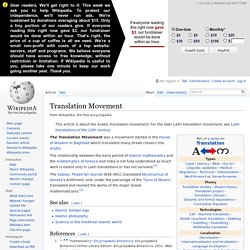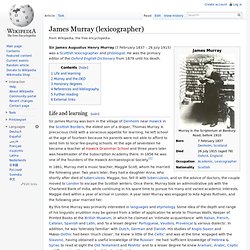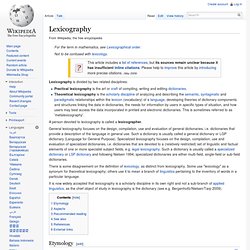

Stephen Fry and Jonathan Ross on our evolving language. Translation Movement. The Translation Movement was a movement started in the House of Wisdom in Baghdad which translated many Greek classics into Arabic.

The relationship between the early period of Islamic mathematics and the mathematics of Greece and India is not fully understood as much work is extant only in Latin translations or has not survived.[1] The Sabian, Thabit ibn Qurrah (836–901), translated Nicomachus of Gerasa's Arithmetic and, under the patronage of the "Sons of Moses", translated and revised the works of the major Greek mathematicians.[1] See also[edit] References[edit] External links[edit] How Greek Science Passed to the Arabs, in which the Barmakids play a considerable role. James Murray (lexicographer)
Sir James Augustus Henry Murray (7 February 1837 – 26 July 1915) was a Scottish lexicographer and philologist.

He was the primary editor of the Oxford English Dictionary from 1879 until his death. Sir James Murray was born in the village of Denholm near Hawick in the Scottish Borders, the eldest son of a draper, Thomas Murray. A precocious child with a voracious appetite for learning, he left school at the age of fourteen because his parents were not able to afford to send him to local fee-paying schools. At the age of seventeen he became a teacher at Hawick Grammar School and three years later was headmaster of the Subscription Academy there. In 1856 he was one of the founders of the Hawick Archaeological Society.[1] In 1861, Murray met a music teacher, Maggie Scott, whom he married the following year. By this time Murray was primarily interested in languages and etymology. In the summer of 1884, Murray and his family moved to a large house on the Banbury Road in north Oxford.
Lexicography. Lexicography is divided by two related disciplines: A person devoted to lexicography is called a lexicographer.

General lexicography focuses on the design, compilation, use and evaluation of general dictionaries, i.e. dictionaries that provide a description of the language in general use. Such a dictionary is usually called a general dictionary or LGP dictionary (Language for General Purpose). Specialized lexicography focuses on the design, compilation, use and evaluation of specialized dictionaries, i.e. dictionaries that are devoted to a (relatively restricted) set of linguistic and factual elements of one or more specialist subject fields, e.g. legal lexicography.
Such a dictionary is usually called a specialized dictionary or LSP dictionary and following Nielsen 1994, specialized dictionaries are either multi-field, single-field or sub-field dictionaries. There is some disagreement on the definition of lexicology, as distinct from lexicography. Etymology[edit] Aspects[edit] Societies: Philology. Philology is the study of language in written historical sources; it is a combination of literary criticism, history, and linguistics.[1] It is more commonly defined as the study of literary texts and written records, the establishment of their authenticity and their original form, and the determination of their meaning. Classical philology is the philology of Classical Sanskrit, Greek and Classical Latin. Classical philology is historically primary, originating in Pergamum and Alexandria[2] around the 4th century BCE, continued by Greeks and Romans throughout the Roman and Byzantine Empires, and eventually taken up by European scholars of the Renaissance, where it was soon joined by philologies of other languages both European (Germanic, Celtic, Slavistics, etc.) and non-European (Sanskrit, Persian, Arabic, Chinese, etc.).
Indo-European studies involves the comparative philology of all Indo-European languages. Etymology[edit] Branches[edit] Comparative[edit] Textual[edit] Cognitive[edit]